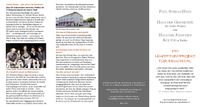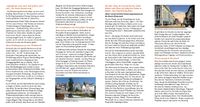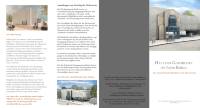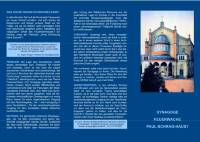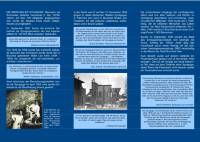Prehistory
It had already been known since March 2017 that the Bruchsal-based company SEW-Eurodrive wanted to build a turnkey fire station for the volunteer fire brigade of our city on the municipal premises in the so named Bahnstadt (railway city), which the city could use free of charge for 30 years. SEW provided the justification for this action in an official statement: "We want to do something good for the region, the city and ourselves". The ground-breaking ceremony for the new building took place in July 2018, and the new fire station is to be occupied from the beginning until mid-2020.
There was not not communicated what was to happen after the fire brigade moved out with the approx. 2,360 sqm synagogue land, the property on which the synagogue stood until its destruction in the night from 9 to 10 November 1938 by angry fanatics. The first Bruchsal synagogue was built there in 1801, well over 200 years ago.
It was only by chance that the considertions of the city administration became aware. the idea was to hand over the synagogue property to an investor who would build it over according to his own taste. By mid-2018, the city administration had already received the relevant investor enquiries.
This was made public on the anniversary of the Reichspogromnacht on 9 November 2017 by the Jüdische Allgemeine Zeitung, which published the following article by Rainer Kaufmann:
Difficult legacy
In 1938 the Bruchsal synagogue burned down - today there is a fire station there.
When Paul Schrag, a lawyer from New York and of Jewish descent, visited his home town of Karlsruhe in Baden for the first time [after WW2] in the 1980s, he also made a detour to neighboring Bruchsal, where his uncle once owned a malt factory. Schrag looked for the site of the former synagogue, which burned down during the pogrom night without the fire brigade intervening.
What he found on this property struck him off: a fire station. That same evening, Schrag told a Bruchsal journalist of the post-war generation about his horror: "Don't you know you can't do this?" Paul Schrag, who years before had documented the "aryanization" of his uncle's Malzfabrik in a small booklet entitled "Heimatkunde" (local history), decided never to visit this city again, where he had spent most of his youth.
In 2018, the Bruchsal fire brigade is to be given a new home, and now the small town is faced with the question of how to deal with this probably unique legacy of its history. Total demolition and forgotten or preservation of the fire station.
FILETSTÜCK. The problem: The location in the city centre is regarded as a filet piece for commerce, offices and apartments. Investors will certainly be tempted to do so, but hardly if they have to somehow include the topic of fire station and synagogue. The public and local council have not yet been informed about the plans of the city administration. But after all that has leaked out, one can assume that economic considerations leave little room for an appropriate approach to post-war construction, which - probably unique in all of Germany - stands for the irresponsible handling of the darkest chapters of German history.
The synagogue was built in 1881 for 140,000 Reichsmark in the neo-Renaissance style, the porch was to be reminiscent of the Dome of the Rock in Jerusalem. In 1926 the church was renovated and decorated by the Bruchsal painter Leo Kahn (born 1894 in Bruchsal and died 1983 in Ramat Gan, Israel).
The property was sold by the Jewish Restitution Successor Organization (JRSO) to the city of Bruchsal in the early 1950s. The use of the site as the site of a fire station built in 1953 is said to have been known to the organization, the critics of this decision are reassured in Bruchsal. It was not until late October 2000, after long discussions, that a plaque was erected on the façade of the fire station to commemorate the former synagogue.
Contemporary witnesses of the 1938 pogrom night remember how the rabbi firefighters at the time, who were tampering with a hydrant, called for something to be done at last. The answer: "We have no water!"
USE IDEAS. Now that it has become known that the volunteer fire brigade will soon be clearing the building, several initiatives have taken the floor to prevent the post-war building from being completely demolished and the site from being silently handed over to the real estate market.
There are some suggestions for future use, for example as a theatre or concert hall for amateur ensembles. Another idea is to house the municipal museum there. So far, it has only played a minor role in the museum and tourist business in Balthasar Neumann's large baroque palace. Only a few Bruchsalers have ever been interested in the rather unlovingly assembled museum. It could be accommodated attractively in the fire station.
Parts of the municipal archive could also find a new home here. Some time ago, the archive had to move to a temporary accommodation in a technology park, far away from the town hall in the city centre. According to the initiative groups, the accommodation of the city archive in the former fire station or in the former synagogue would be appropriate for the history of the square and the building. It was also proposed to document the great Jewish heritage of Bruchsal in detail in a separate section of the archive, above all the human fate of the former Jewish population of the city.
RESPONSIBILITY. In the coming weeks and months, the municipal council of the city will probably have to deal with this sensitive issue, whether it likes it or not. And then it will become clear whether economic considerations prevail or a responsible approach to history.
Bruchsal, according to the advocates of a historical solution, could also claim to have learned from history nationwide, above all from the thoughtlessness of the post-war period, and to have documented this for all times in the form of the newly used fire station.
And so it went on
The ice was broken. The topic was taken up by Verein bruchsalia (VEHBB e.V.) and after a public event and in many discussions and meetings the idea of the "House of the History of Baden Jews" was developed. In order to be able to continue to pursue this topic in a concentrated and targeted manner, the association "Haus der Geschichte badischer Juden e.V." (House of the History of Baden Jews) was founded as a non-profit organization dedicated to promoting this idea.
In the meantime, the Bruchsal city administration also took up the topic of synagogue properties. It was clear that this historically heavily burdened property should not simply be left to an investor to realise his commercial interests. Further events and an idea competition led to an open idea competition for the subsequent use of the synagogue grounds after a public hearing and idea finding process.
Membership
Become a member of the association and help to launch the ambitious project "House of the History of Baden Jews".





